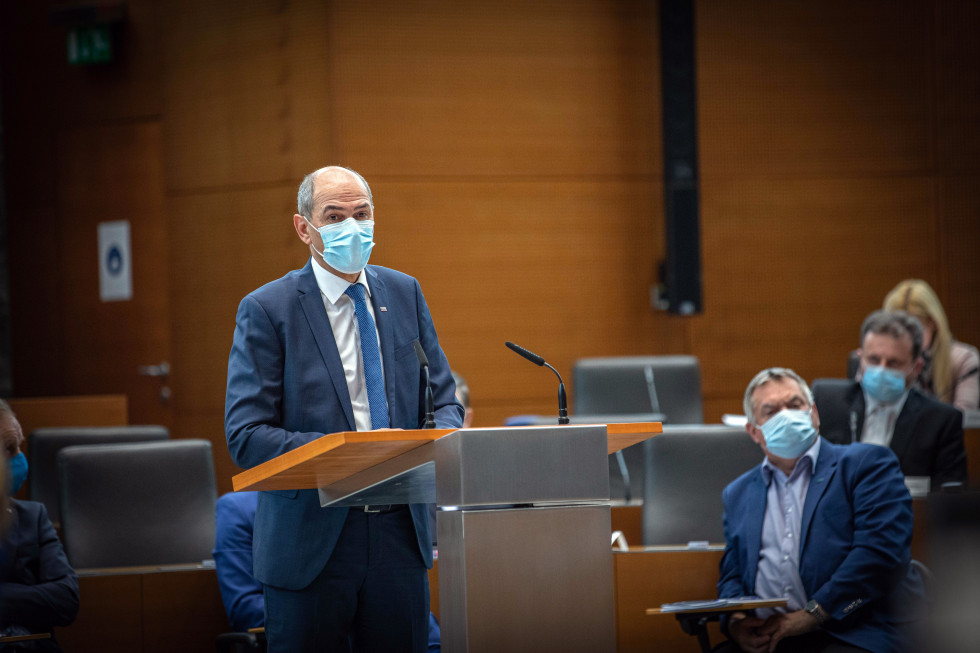At wednesday’s 49th extraordinary session of the National Assembly, Prime Minister Janez Janša presented in detail the draft Act determining intervention measures to contain the consequences of the second wave of COVID-19, or the sixth anti-corona package for mitigating and eliminating the effects of the COVID-19 epidemic, and the legislative package aimed at maintaining the condition of society, the state, and the economy, after the epidemic.
During his speech, Prime Minister Janez Janša initially summed up the implemented measures from the first five anti-corona packages, and emphasised that with the packages adopted so far, the Government has managed to address the problems of virtually all citizens.
Most of the funds were earmarked for the preservation of employment. Namely, the Government introduced a measure to compensate wages for temporarily laid-off employees. Over EUR 300 million has been disbursed for this purpose, and almost 150,000 employees have benefited directly from this form of aid. Over EUR 110 million of basic monthly income has been paid out for the self-employed – tens of thousands of beneficiaries have received this form of aid.
Due to the additional burden and exposure to danger during the epidemic, almost EUR 200 million was disbursed. The Government has helped Slovenian tourism with tourism vouchers, which have so far been redeemed by over 800,000 citizens – those who have not yet used them will be able to do so next year.
The Government subsidised the provision of public services in education, provided aid for agricultural activities, namely, over 10,000 farmers received aid; moreover, it exempted various vulnerable groups from contribution payments – 151,000 people received benefit payments and almost 500,000 people received payments for social, pension, and disability insurance.
300,000 pensioners with the lowest pensions received a solidarity allowance, and more than 30,000 beneficiaries received an increased amount of large family allowance. Additional funds in the amount of EUR 100 million were earmarked for medical protective and additional personal equipment – the costs incurred in the affected sectors in health care were covered in the amount of EUR 100 million.
With the sixth anti-corona package, the Government aims to maintain the condition of society, the state, and the economy. With the measures of this sixth package, the Government has fully taken into account the needs of the economy; thus, the sixth anti-corona package envisages the possibility of 100 percent unemployment benefit for employees temporarily laid-off in all companies, of which the benefits received as state aid do not exceed EUR 800,000. Other companies are entitled to 80% unemployment benefit for temporarily laid-off employees.
The maximum amounts of wage compensation are also increased to the amount of the average salary. In the new Act, the Government allocates funds to partially cover fixed costs. The funds are intended for the provision of additional information technology in education, the deadlines for meeting the conditions of young researchers are extended, and additional funds are intended for subsidising protective equipment for high school and university students in the field of health care. With the sixth package, the state is introducing co-financing for parents whose children (up to and including the age of 14) are hospitalised. The guarantee scheme will be released, the moratorium on loans is to be extended, and exemption from payment for kindergartens is to be granted. Hot meals will be provided for children from socially disadvantaged families.
Prime Minister Janez Janša also announced the seventh anti-corona package, “with which we will focus our attention to the time when we believe we will be freed from this epidemic.” The package will be oriented towards the period after the new year, which, according to Prime Minister Janez Janša, will be the period of epidemic cessation due to an effective vaccine. In this package, the Government will also address the problems that only emerged in the second wave.
Finally, Prime Minister Janez Janša once again invited all opposition parties to constructive cooperation and the submission of proposals for the seventh anti-corona package, and added that the Partnership for Development offer from May still stands. “The parties involved in the creation of legal foundations are equitable, irrespective of whether they are in a coalition or a partnership. The offer still stands and those with ideas are invited to accept it,” said Prime Minister Janez Janša.


